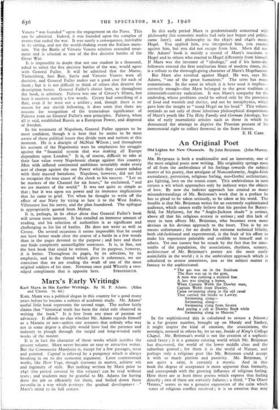Marx's Early Writings
KARL. MARX was a political slogan in this country for a good many years before he became a subject of academic study. Mr. Adams' useful little book represents the second stage. The author fairly claims that "historical truth has been the strict rule observed in writing the book." It is free from any trace of passion or advocacy. It affords no clue whether Mr. Adams regards himself as a Marxist or not—unless one assumes that nobody who was not in some degree a disciple would have had the patience and industry to plough through the turgid and long-winded early works of the master.
It is in fact the character of those works which justifies the present volume. Marx never became an easy or attractive writer. But the Communist Manifesto is, except for a few passages, terse and pointed. Capital is relieved by a pungency which is always breaking in on its dry economic argument. Later controversial works, like Herr Vogt, though tiresome in matter, achieve wit and ingenuity of style. But nothing written by Marx prior to 1847 (the period covered by this volume) can be read without tears ; and students may be grateful to Mr. Adams for having done the job so efficiently for them, and boiled down these juvenilia in a way which portrays the gradual developmer t fr Marx's mind to its full stature.
In this early period Marx is predominantly concerned with philosophy (his economic studies had only just begun and politic, came later); and philosophy in the 1830's and 1840's meant Hegel. You applied him, you interpreted him, you reacted against him, but you did not escape from him. Marx did not Mr. Adams' book is mainly a record of Marx's reactions to Hegel and to others who reacted to Hegel differently from himself. If Marx was the inventor of "ideology," and if his latter-day followers erected the first totalitarian State of modem times, this is a tribute to the thorough-going character of Marx's Hegelianism.
But Marx also revolted against Hegel. He was, says Mr. Adams, "one of the great humanists." The term has many connotations. In the sense in which it is here used it implies— correctly enough—that Marx belonged to the great tradition of nineteenth-century radicalism. It was Marx's sympathy for the underdog, whose problems could be solved only by the provision of food and warmth and shelter, and not by metaphysics, which gave him the insight to "stand Hegel on his head." This volume reminds us not only of those laborious philosophical disquisitions of Marx's youth like The Holy Family and German Ideology, but also of early journalistic articles such as those in which he denounced the attempt to deprive the Prussian peasant of his immemorial right to collect firewood in the State forests.
E. H. CARR.


































 Previous page
Previous page